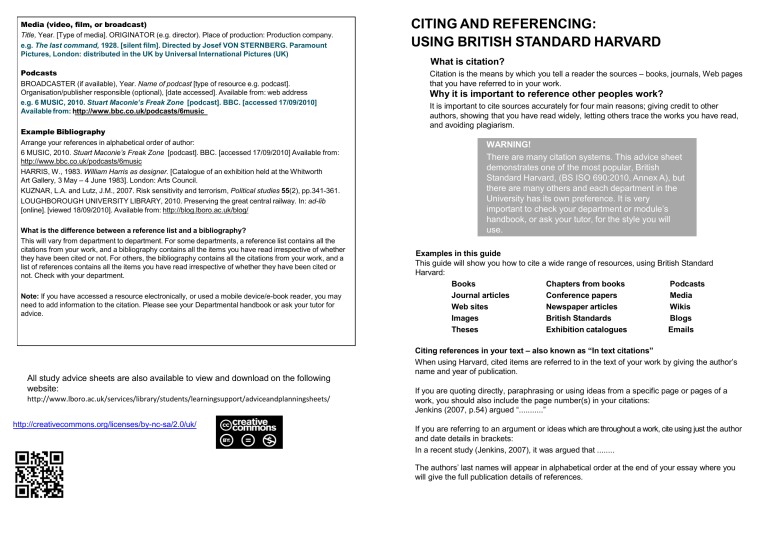citing and referencing: using british standard harvard

Media (video, film, or broadcast)
Title, Year. [Type of media]. ORIGINATOR (e.g. director). Place of production: Production company. e.g. The last command, 1928. [silent film]. Directed by Josef VON STERNBERG. Paramount
Pictures, London: distributed in the UK by Universal International Pictures (UK)
Podcasts
BROADCASTER (if available), Year. Name of podcast [type of resource e.g. podcast].
Organisation/publisher responsible (optional), [date accessed]. Available from: web address e.g. 6 MUSIC, 2010. Stuart Maconie’s Freak Zone [podcast]. BBC. [accessed 17/09/2010]
Available from: http://www.bbc.co.uk/podcasts/6music
Example Bibliography
Arrange your references in alphabetical order of author:
6 MUSIC, 2010. Stuart Maconie’s Freak Zone [podcast]. BBC. [accessed 17/09/2010] Available from: http://www.bbc.co.uk/podcasts/6music
HARRIS, W., 1983. William Harris as designer. [Catalogue of an exhibition held at the Whitworth
Art Gallery, 3 May – 4 June 1983]. London: Arts Council.
KUZNAR, L.A. and Lutz, J.M., 2007. Risk sensitivity and terrorism, Political studies 55 (2), pp.341-361.
LOUGHBOROUGH UNIVERSITY LIBRARY, 2010. Preserving the great central railway. In: ad-lib
[online]. [viewed 18/09/2010]. Available from: http://blog.lboro.ac.uk/blog/
What is the difference between a reference list and a bibliography?
This will vary from department to department. For some departments, a reference list contains all the citations from your work, and a bibliography contains all the items you have read irrespective of whether they have been cited or not. For others, the bibliography contains all the citations from your work, and a list of references contains all the items you have read irrespective of whether they have been cited or not. Check with your department.
Note: If you have accessed a resource electronically, or used a mobile device/e-book reader, you may need to add information to the citation. Please see your Departmental handbook or ask your tutor for advice.
All study advice sheets are also available to view and download on the following website: http://www.lboro.ac.uk/services/library/students/learningsupport/adviceandplanningsheets/ http://creativecommons.org/licenses/by-nc-sa/2.0/uk/
CITING AND REFERENCING:
USING BRITISH STANDARD HARVARD
What is citation?
Citation is the means by which you tell a reader the sources – books, journals, Web pages that you have referred to in your work.
Why it is important to reference other peoples work?
It is important to cite sources accurately for four main reasons; giving credit to other authors, showing that you have read widely, letting others trace the works you have read, and avoiding plagiarism.
WARNING!
There are many citation systems. This advice sheet demonstrates one of the most popular, British
Standard Harvard, (BS ISO 690:2010, Annex A), but there are many others and each department in the
University has its own preference. It is very important to check your department or module’s handbook, or ask your tutor, for the style you will use.
Examples in this guide
This guide will show you how to cite a wide range of resources, using British Standard
Harvard:
Books
Journal articles
Chapters from books
Conference papers
Podcasts
Media
Web sites
Images
Theses
Newspaper articles
British Standards
Exhibition catalogues
Wikis
Blogs
Emails
Citing references in your text – also known as “In text citations”
When using Harvard, cited items are referred to in the text of your work by giving the author’s name and year of publication.
If you are quoting directly, paraphrasing or using ideas from a specific page or pages of a work, you should also include the page number(s) in your citations:
Jenkins (200 7, p.54) argued “...........”
If you are referring to an argument or ideas which are throughout a work, cite using just the author and date details in brackets:
In a recent study (Jenkins, 2007), it was argued that ........
The authors’ last names will appear in alphabetical order at the end of your essay where you will give the full publication details of references.
Citing sources in your reference list
For each type of material you cite you will need a slightly different arrangement:
Book st
AUTHOR(S), Year. Title . Edition
– if not the 1 . Place of publication: Publisher. e.g. KOOP, G., 2005. Analysis of economic data . 2nd ed. Chichester: Wiley.
Chapter from an edited book
AUTHOR(S), Year. Title of chapter. In: AUTHOR(S)/EDITOR(S), ed(s). Book title.
Edition. Place of publication: Publisher, Pages. (use p. or pp.) e.g. DAVIES, S., 2002. The Professor, Agnes Grey and Wuthering Heights. In: H.
Glen, ed. The Brontes. Cambridge: Cambridge University Press, p. 75.
Journal article
AUTHOR(S), Year. Title of article. Title of journal , Vol. no .(Part no./Issue/Month),
Pages. e.g. KUZNAR, L.A., and LUTZ, J.M., 2007. Risk sensitivity and terrorism.
Political studies, 55(2), 341 – 361.
Website
(Some websites do not have all the citation elements so cite all the ones you can find)
AUTHOR(S), Year. Title of document . [online]. Organisation responsible (optional).
[date viewed]. Available from: web address e.g. DARLING, A., 2009. Speech by the Chancellor of the Exchequer at Mansion
House . [online]. HM Treasury, London. [viewed 17/06/2009]. Available from : http://www.hmtreasury.gov.uk/speech_chex_2009_index.htm retrieved July 14 th 2009
Newspaper articles
AUTHOR(S), Year. Article title. Newspaper title , Day and Month (abbreviated), Pages.
(use p. or pp.) e.g. BROWN, P., 2002. New foot and mouth outbreak suspected. The Guardian ,
27th Feb, p. 1.
Image
ARTIST, Year. Title of the work [Material types]. At or In: (where found, for example in a book or museum). IN: AUTHOR/EDITOR of book, Year. Title. Place of publication:
Publisher. e.g. MASOLINO, T., 1427 The Temptation of Adam and Eve [Painting]. In:
BRUCEMITFORD, M., 1996. The Illustrated Book of Signs and Symbols .
London: Dorling Kindersley.
Papers in conference proceedings
AUTHOR(S), Year. Title. In: EDITOR(S) Title of conference proceedings. Place and date of conference (unless included in title). Place of publication: Publisher, Pages.
(use p. or pp) e.g. GIBSON, E.J., 1977. The performance concept in building. In: Proceedings of the7th CIB Triennial Congress, Edinburgh, September 1977 . London:
Construction Research International, pp. 129-136 .
British Standards
NAME OF AUTHORISING ORGANISATION, Year. Number and title of standard .
Place of publication: Publisher. e.g. BRITISH STANDARDS INSTITUTE, 2008. BS ISO 81782: Reciprocating internal combustion engines
– Exhaust emission measurement
. London:
British Standards Institute.
Theses and dissertations
AUTHOR, Year. Title . Designation (Level, e.g. MSc, PhD.), Institution. e.g. MARSHALL, J., 2002. The Manuscript tradition of Brunetto
Latini’s
“Tresor” . Unpublished thesis (PhD), University of London.
Exhibition catalogues
ARTIST, Year. Title of exhibition. [Exhibition catalogue]. Place of publication:
Publisher. e.g. HARRIS, W., 1983. William Harris as designer. [Catalogue of an exhibition held at the Whitworth Art Gallery, 3 May – 4 June 1983]. London: Arts Council .
Electronic messages from a public domain. e.g. discussion boards or conferences
.
AUTHOR (of message), Year. Title. In: Electronic conference or bulletin board [online].
[date viewed]. Available from: web address e.g. WOODPUD, 2006. Problems with kernel 2.6.17-4. In: Ubuntu forums: Edgy
Eft development [online]. [viewed 10 July 2006]. Available from: http://www.ubuntuforums.org
Weblogs (Blogs)
AUTHOR, Year. Title of the posting (if applicable). In: Title of the blog [online]. [date viewed]. Available from: web address e.g. LOUGHBOROUGH UNIVERSITY LIBRARY, 2010. Preserving the great central railway. In: ad-lib [online]. [viewed 18/09/2010]. Available from: http://blog.lboro.ac.uk/blog/
Wiki
WIKI NAME, Year. Title of article [online]. [date viewed]. Available from: web address e.g. LIBRARYWIKIS, 2008. Collaboration between libraries . [online]. [viewed
17/09/2010] Available from: http://librarywikis.pbworks.com/Collaboration- between-Libraries
